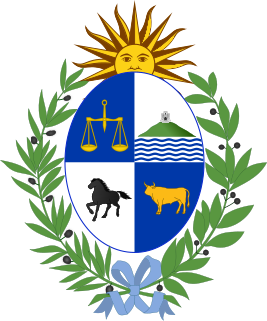 W
WThe coat of arms of Uruguay or Uruguayan shield was first adopted by law on March 19, 1829, and later on had some minor modification in 1906 and 1908. It was supposedly designed by Juan Manuel Besnes Irigoyen (1788–1865).
 W
WThe National Cockade of Uruguay was first adopted by law on December 22, 1828. It features the colours of the national flag, blue and white.
 W
WErythrina crista-galli, often known as the cockspur coral tree, is a flowering tree in the family Fabaceae, native to Argentina, Uruguay, southern Brazil and Paraguay. It is widely planted as a street or garden tree in other countries, notably in California. It is known by several common names within South America: ceibo, seíbo (Spanish), corticeira (Portuguese) and the more ambiguous bucaré, to name a few. Its specific epithet crista-galli means "cock's comb" in Latin.
 W
WThe "Himno Nacional de Uruguay", also known by its incipit "Orientales, la Patria o la Tumba", is the longest national anthem in terms of duration with 105 bars of music, though an abridged version is performed on most occasions.
 W
WJoaquín Luis Miguel Suárez de Rondelo was a Uruguayan political figure.
 W
WThe Sun of May is a national emblem of Argentina and Uruguay, and appears on the flags of both countries.
 W
WOur Lady of the Thirty-Three, also known as the Liberator of Uruguay, is a title of the Virgin Mary and the Patroness of Uruguay.
 W
WThe national flag of Uruguay is one of the three official flags of Uruguay along with the flag of Artigas and the flag of the Treinta y Tres. It has a field of nine equal horizontal stripes alternating white and blue. The canton is white, charged with the Sun of May, from which 16 rays extend, alternating between triangular and wavy. The flag was first adopted by law on December 16, 1828, and had 19 stripes until July 11, 1830, when a new law reduced the number of stripes to nine. The flag was designed by Joaquín Suárez.